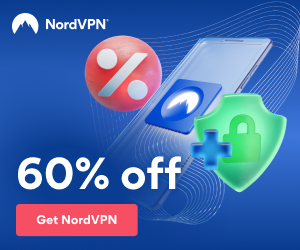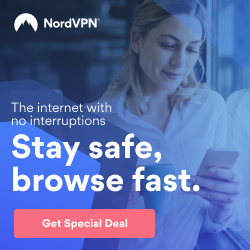The Internet can be a treacherous place. It’s easy to get caught up in a cyber accident, from companies gathering data to hackers stealing personal information. The results can be disastrous.
One of the most important measures you can take while online is to use a virtual private network (VPN), whether you’re at your workplace, on the go, or at home.
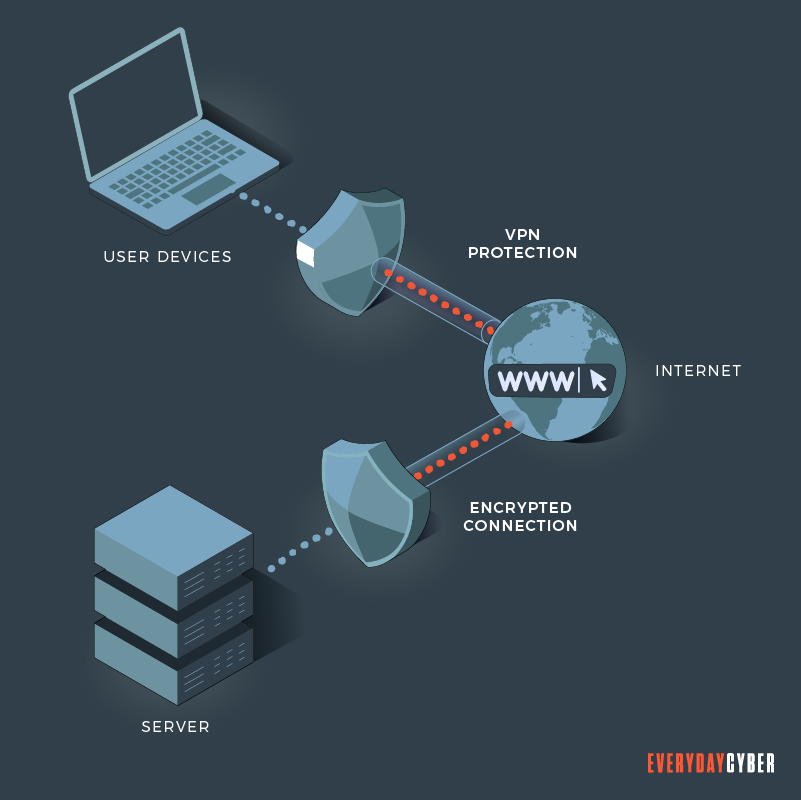
You may well have heard about VPNs, presumably even knowing what they are. You might have even asked yourself “why use one when it could slow down your computer and give you additional bills?”
While one of the common uses of a
A Brief Definition of VPN
The term
This means that everything you do online is kept private. Nobody will know what you’re doing on the Internet, with the possible exception of the
How does a VPN work?
VPN establishes a protected network connection. When using a
Your online traffic is subsequently routed through that server rather than directly to the Internet. When it comes to websites, you’re browsing from that server’s location, not your computer’s.
This means that all of your online activity will appear to originate from the
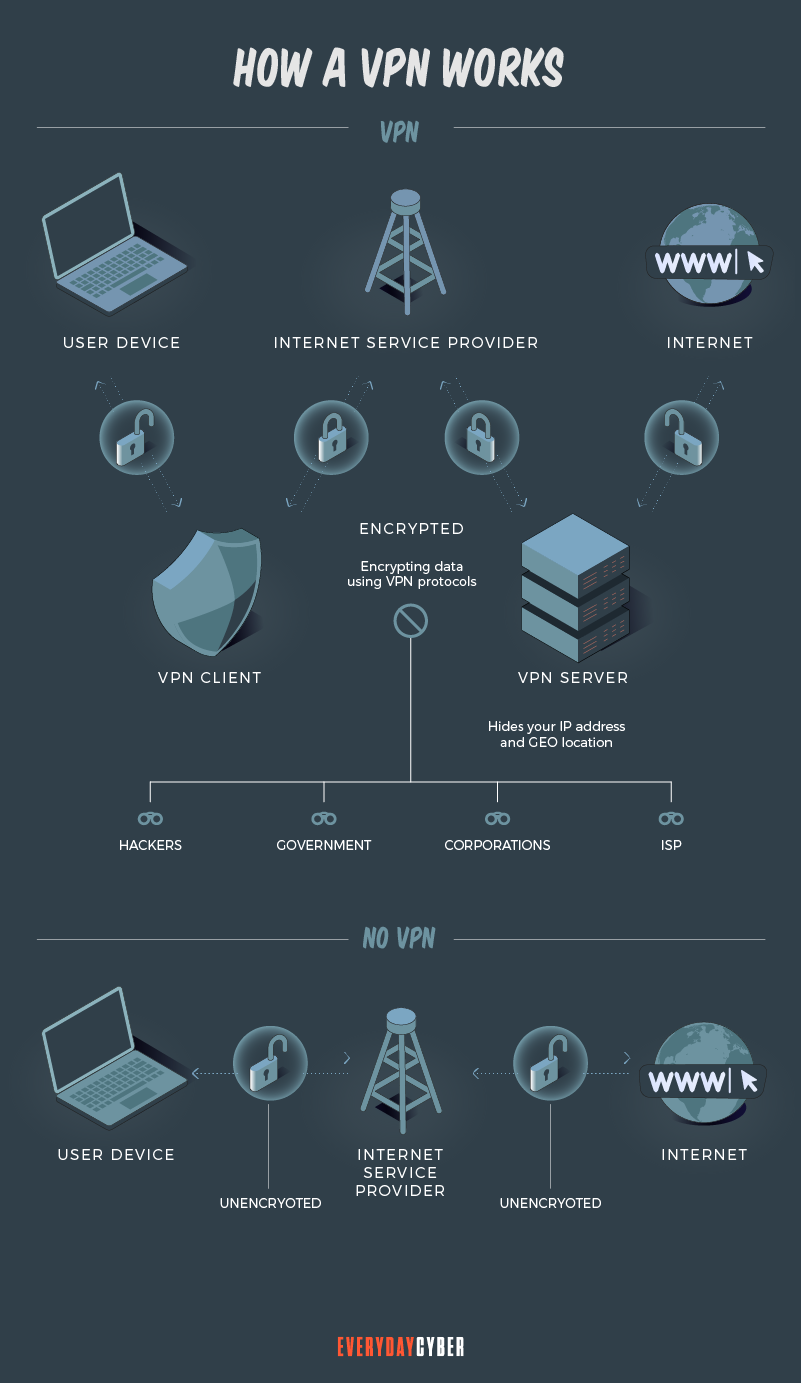
Once you’ve connected to the
Hackers will have a tougher time obtaining your login credentials or redirecting your computer to a fake site if you’re using public Wi-Fi, such as at a café. Anyone trying to spy on you, even your Internet service provider, will have a difficult time determining which websites you’re accessing.
Plus, you get the added benefit of spoofing your location. If you’re in New York and your
Are connections encrypted?
Encryption is a key element of most excellent VPNs. They also have a no-logs policy, which means they don’t track what you do, where you go, or what information you share.
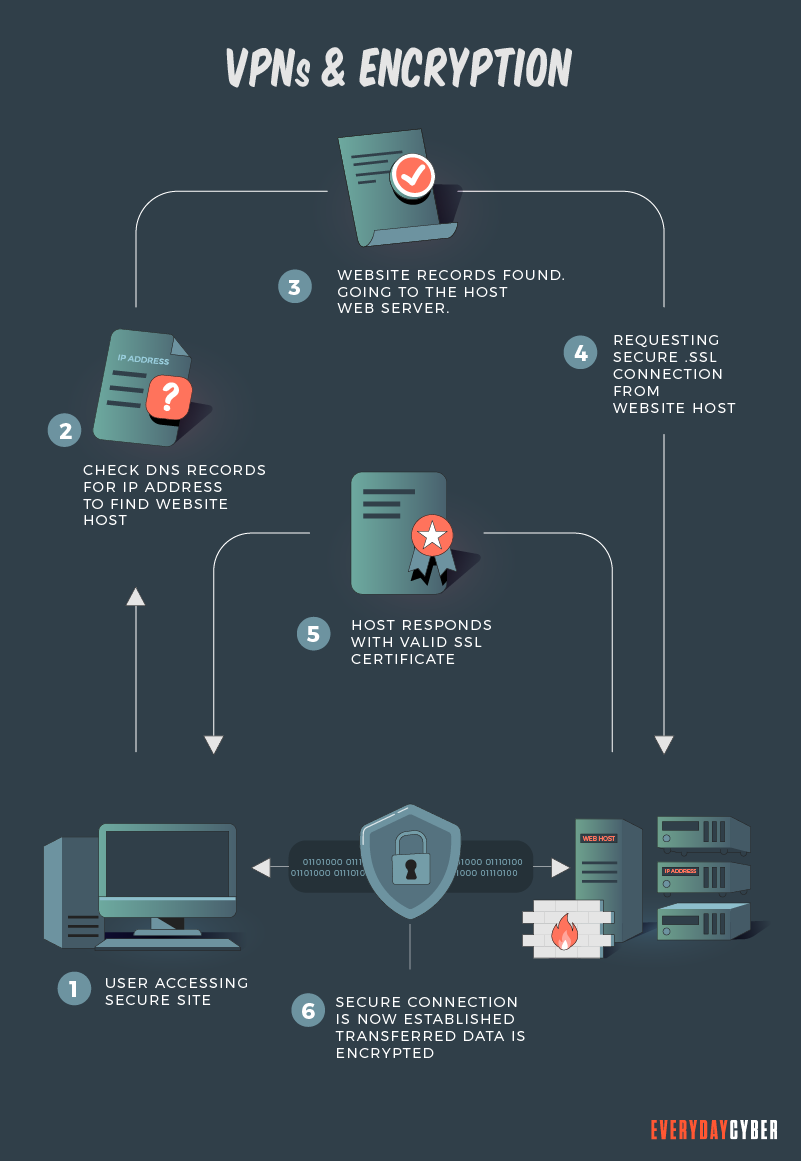
Some VPNs, on the other hand, log data, but they collect as little information as possible. Some providers delete logs in a couple of hours or days, while others keep them for months.
Can you use a VPN with multiple devices?
Top VPNs allow you to connect from several devices, including your laptop, smartphone, tablet, and more. Some even provide unrestricted access.
You can also link various devices to different servers. When you connect your
Main Benefits of a VPN
At its most basic level, using a
It lets you remain anonymous by masking information such as your IP address, location, and search history. This prevents websites, Internet browsers, cable companies, Internet service providers, and others from tracking you.
It improves your
However, a
By entering your email address you agree to receive emails from EveryDayCyber. We'll respect your privacy and you can unsubscribe at any time.
Specific Benefits of a VPN
What are the specific benefits of using a virtual private network and how crucial is it to have one? Using a
Safeguard your identity
Your data may be at risk anywhere between your device and your destination. You can eliminate this risk by encrypting your data and streaming your Internet connection through a
A
A
Avoid being tracked
It’s reasonable that many people object to ISPs and governments collecting and using consumers’ data for their own gain. So your data should be yours and yours alone.
Some ISPs may use your data for less noble purposes. While they already profit from your Internet subscription, some may supplement their income by selling personal information to advertisers. If you want to avoid targeted advertising so you can be more free to look for what you want without worrying about being tracked, a
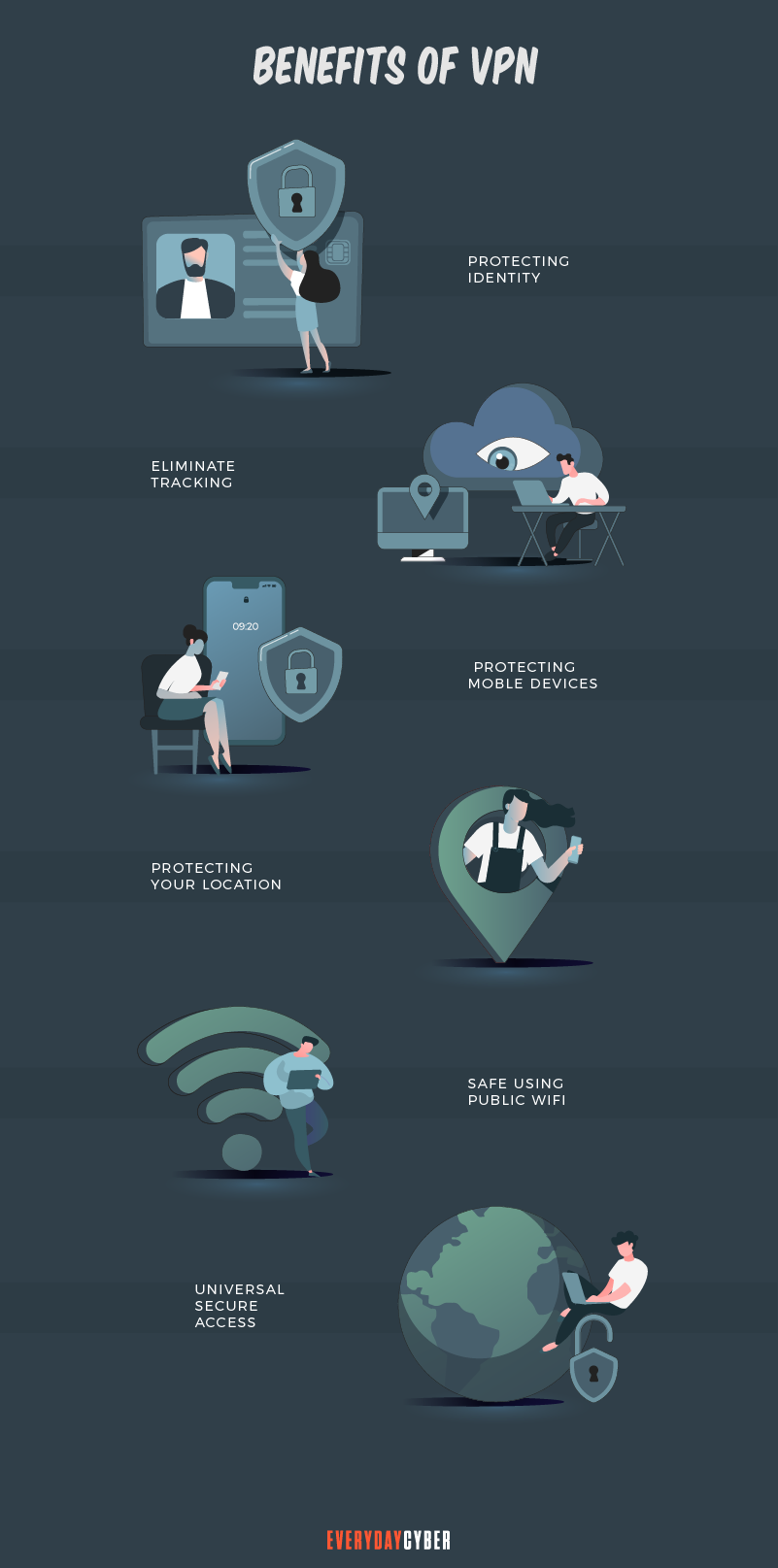
While governments may have valid reasons in tracking illegal activity, if you’re an individual doing what is right and wanting to protect your data from prying eyes you need to consider using a
Protect your mobile devices
You can protect yourself both at home and while out and about by using a
For people who are always on the go, smartphones and tablets are their staple companions. The need to protect data and online activity on them is all the more important. Trusted
Many reputable VPNs allow up to 10 simultaneous connections, and in exceptional situations, unlimited connections. So, if you have many devices to protect, ensure your provider can offer secure connections to all your
Fake (in a good way) your geographic location
Why would you want to spoof your GPS location? Certainly not for malicious purposes, but for streaming content that may not be available in places you’re traveling to.
Videos or other media content available on your preferred streaming service may differ by region. As a result, if you’re traveling abroad, you might discover that your favorite Netflix show has disappeared.
With a
Another benefit of spoofing your geographic location is to shop for cheaper prices. Prices of similar products may vary from country to country. Using a
Avoid data and bandwidth throttling
ISPs might limit data usage to improve Internet speed for select consumers. Data throttling occurs when you’ve used a specific amount of data and your Internet service provider slows it down as a response. Not only will your data be safe from prying eyes like ISPs and others, but you won’t be limited by a data cap if you use a
When traffic is heavy, ISPs may also slow down your Internet speed. A
Be safe when connecting to public Wi-Fi
Another unsafe activity that may be avoided by using a
There’s a good chance your data is at risk if you use public Wi-Fi at cafés, supermarkets, public transportation, or bars.
If the connection you’re using is unencrypted and unsecured, there’s a good possibility that cyber thieves may notice your activity and use it to steal your personal data.
Criminals may intercept your connection via a man in the middle attack. This might include your social media and email logins, credit card information, and even your online banking login information.
If you wish to protect yourself against this, you should use a
Have secure access to home, workplace, school, and social media networks
VPNs are especially beneficial to travelers if they want to check on the networks they have left at home.
When you’re traveling, your access to your company or workplace’s network may be limited geographically. Many organizations use VPNs, either formally or informally, to allow employees to access intranets and other data repositories.
Students also benefit from VPNs, particularly those moving home from their college campuses. For example, if you’re a student studying in the U.K. and coming home to Canada for the summer, you could use a
When you’re feeling homesick abroad, you’ll want to check on family and friends. A
Free VPN vs Paid VPN
Which is right for you? It all depends on your level of need for privacy,
It may be tempting to use a free
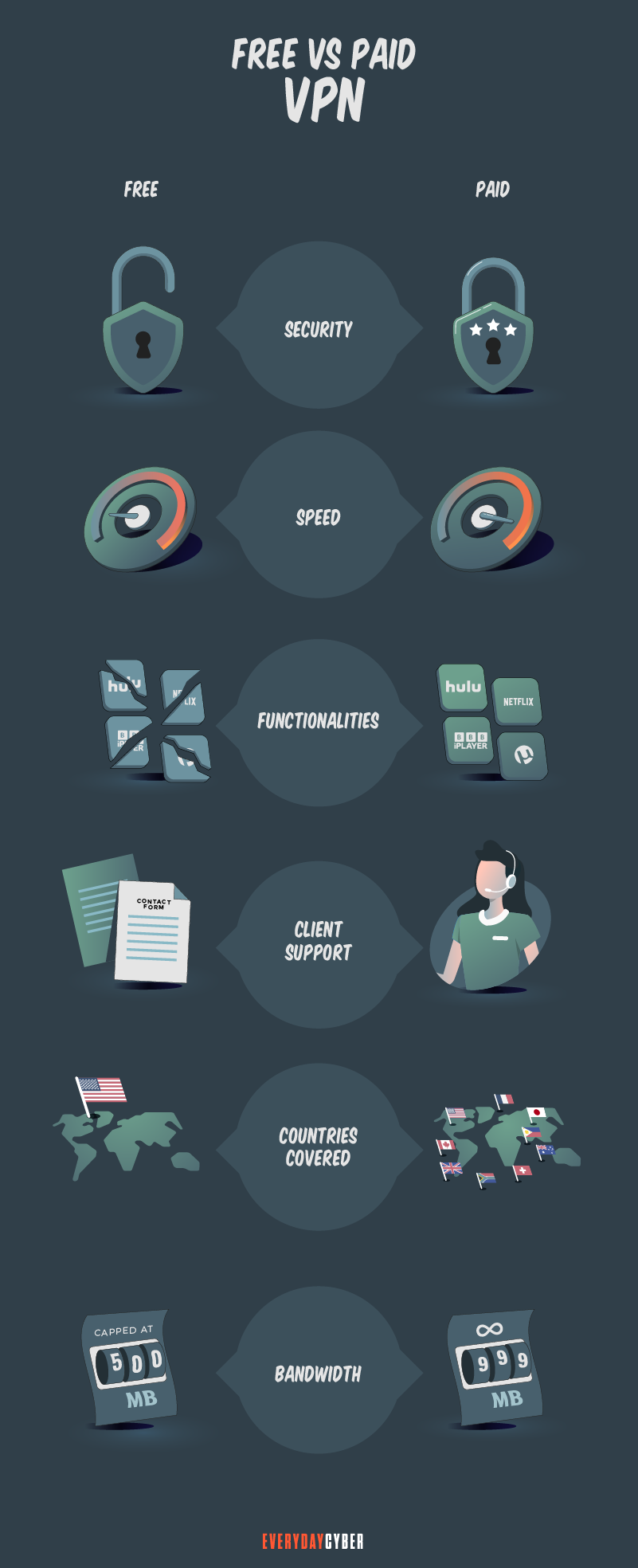
Let’s dive into what services each can or can’t offer.
Free VPN
A free
A
Even though free
And how do they do this? Here are some of the ways:
- They track and may sell your browsing data
You may believe that no one is interested in what you do online. But you would be shocked at how valuable your information is to some data buyers. Users’ data is purchased by data brokers. They subsequently sell it to third-party advertisers for a commission. A database storing data on your browsing activities could be in high demand.
Free
- They launch an advertising blitz
Displaying advertising in the app is a popular way to monetize free
However, being constantly barraged with advertisements can be irritating, and closing them might be difficult at times. Worse, some advertisements may be harmful, infecting your device with malware.
- They egg you on to upgrade to a paid version
To entice clients, several free
It’s suggested that you keep your
Downside of a free VPN
The limited features of a free
- Privacy issues – Since free
VPN providers can sell your data to third party advertisers, your privacy is compromised. - Insufficient
security – Since freeVPN vendors don’t charge subscription fees, they may only offer limited encryption functionalities. Weak encryption means weaksecurity . - Inferior performance – A free version can never compare with a paid version when it comes to performance. You’ll have to contend with slow Internet connections or unreliable streaming.
Paid VPN
A paid
1. It guarantees strong privacy
Your session data should disappear when you disconnect from the Internet. And it will if you use a paid
2. It offers excellent security
The finest VPNs offer end-to-end AES
Other extra capabilities that many VPNs provide are Split tunneling, Double
3. You’re given various choices from an extensive server network
Paid VPNs offer unrestricted access to their entire server networks, which are frequently massive and span the globe. They run their networks with meticulous management to sustain the trust of their customers.
As a result, you’ll have more geo-restricted services and websites available to you. The more servers, the better for unblocking sites and improving connection speed.
4. It provides unlimited bandwidth and speed
You can use a premium
5. It allows you to enjoy other excellent features not found in a free VPN
Paid VPNs come with extra features that enhance your browsing experience while providing
For instance, NordVPN’s Dark Web Monitor will alert you if your credentials are leaked to the dark web. Threat Protection is another unique feature that protects your privacy and
There are instances when you may be unable to access some websites and media in some countries. China, Iran, and Russia are among the countries that block social networking platforms, Western news sites, and numerous web pages and apps.
With a premium
Our final thoughts. So, is it necessary to use a
A free
A premium solution is the way to go if you want solid privacy and
By entering your email address you agree to receive emails from EveryDayCyber. We'll respect your privacy and you can unsubscribe at any time.
Recommended Reading
Things About Ryuk Ransomware You Need to Know Right Now
Ryuk ransomware is one of the most dreaded malware to date. It encrypts or steals corporate data to extort millions of dollars from its victims. The Covid-19 crisis greatly influenced the recent rise in ransomware. The remote work response to the pandemic created huge gaps in the worlds cyber defenses. Threat actors saw these vulnerabilities as opportunities to spread large-scale ransomware attacks.
What is a Computer Worm?
A computer worm is not a cute, squiggly little creature. It is an evil, malicious piece of software destined to wreak chaos and disaster on many devices.
What is Spear Phishing and How to Protect Yourself from It?
Spear phishing activities are becoming more sophisticated and rampant. The best defense against it is to maintain a vigilant mindset.
What is Malware?
Malware or “malicious software” is a cybersecurity term used to describe software that steals your data, spies on you, damages your devices, and generally causes chaos and destruction.
What is ATM Skimming and Ways to Protect Yourself
ATM skimming can lead you to losing all your money in your bank account. Here's how to protect yourself from it.
What is Typosquatting?
Cybercriminals target visitors that accidentally mistype website addresses directly into their browsers. They use typosquatting, also called URL hijacking, to deceive visitors and lead them to malicious sites they themselves have set up.

